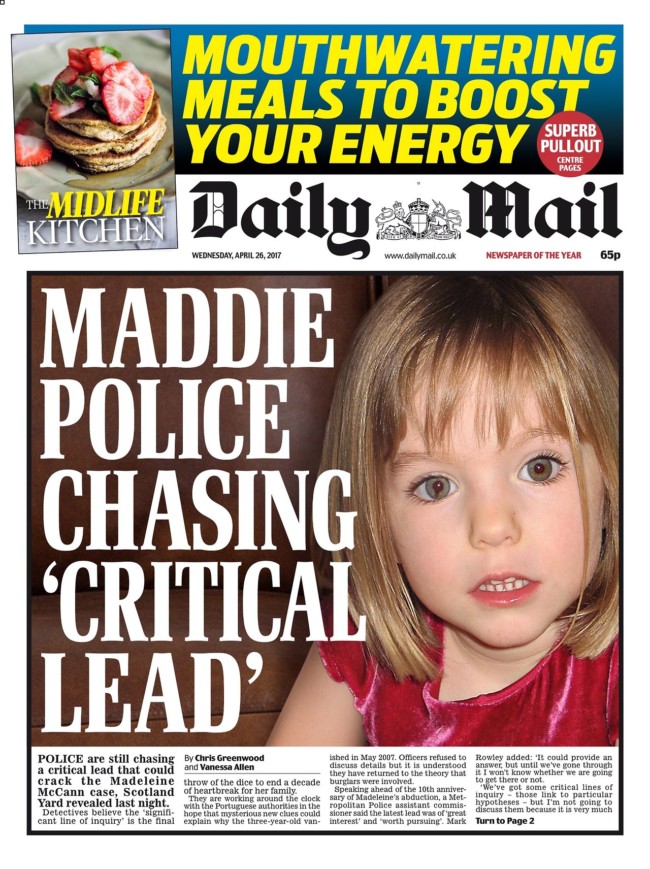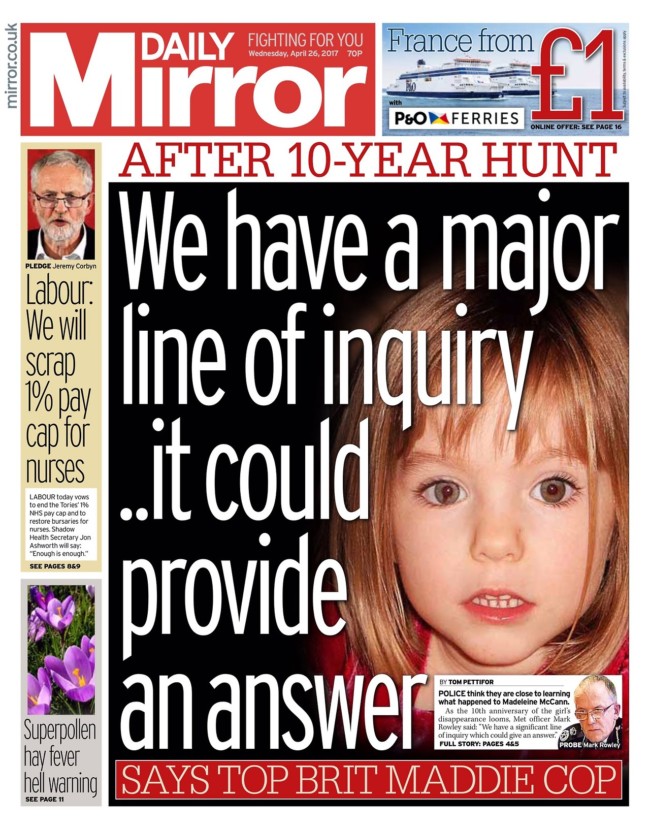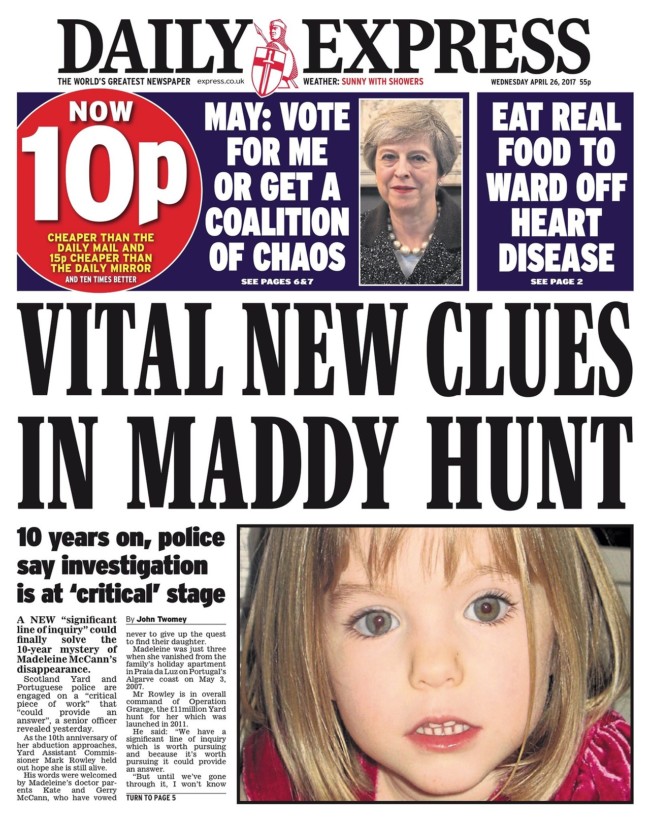Madeleine McCann: the Met’s 10th anniversary PR exercise ‘COULD’ be news
Madeleine McCann: 10th anniversary news round-up.
The Daily Mail (front page): “MADDIE POLICE CHASING ‘CRITICAL LEAD'”.
That Madeleine McCann remains front-page news 10 years after her vanishing – and after ten years of no evidence of what happened to her emerging – is remarkable. As for the news, we learn that police are “chasing a critical leader”. How critical? Well, it “could crack the Madeleine McCann case”. So only potentially critical, then.
What of the “mysterious new clues”, then, that “could explain why the three-year-old vanished in May 2007″?
We hear from Mark Rowley, a Metropolitan Police assistant commissioner, who tells us that the “latest lead” is “worth pursuing”. He says: “It could provide an answer, but until we’ve gone though it I won’t know whether we are going to get there or not.”
That’s three “coulds” on the front page alone. So much for the “critical lead”. Rowley says – without irony – “I’m not going to discuss…because it is very much a live investigation”.
The Mirror makes “COULD” part of its front-page lead. It could just as easily says ‘Could Not”.
Millions of pounds invested in the search for answers and still none are forthcoming. Ten years of looking and the Met are in full PR mode. They “don’t want to spoil it by putting titbits of information our publicly,” says Rowley as he chucks a tasty morsel to the Press. Indeed, this isn’t a hunt for alleged VIP sex criminals. There will be no televised raids and no airport arrests. So can Rowley tell us anything? “We don’ have evidence telling us if Madeleine is alive or dead.” says Rowley, “but as a team we are realistic about what we might be dealing with.”
As the Met gets realistic about theories, the Mail moves on to look at the parents. Over pages 4 and 15, we get “10 YEARS OF PAIN”.
Pages 14-15: “Maddie’s bedroom is piled high with a decade of unopened gifts. Kate’s given up work to care or their twins – while Gerry’s now a world-renowned heart doctor. As police reveal a ‘significant’ new line of inquiry… 10 YEARS OF HOPE AND HEARTBREAK”.
What a parent looking after their own children has to do with the case is moot, moreover the husband’s job. But this story always was laced with a middle-class thread. The blonde child. The medical professional parents. The upmarket holiday camp destination. It all overshadows the fact that police only might have a significant new line of enquiry. We don’t know. They don’t know. All we know is that Kate McCann is a “fitness fanatic” who “finds finds comfort in daily work-outs at he gym”; Gerry McCann “was recently praised for saving the life of former footballer Alan Birchenall after he suffered a heart attack and ‘died’ for seven minutes”; and “they have coped in different ways with the tragedy”.
Daily Express (front page): “VITAL NEWS CLUES IN MADDY HUNT.”
No. They could be critical clues. They might not be of any value at all. The Express notes that Operation Grange, the police investigation, has cost £11m.
Page 5: “Yard reveals ‘critical lines of inquiry’ in Maddy case.” It did. And it didn’t. The Met mentioned the leads and then said they were secret.
The paper does have some news, though. We learn that in 2013, “officers identified four people as possible suspects but they have now been ruled out.”
The Telegraph prefers to lead with a question: “Madeleine McCann: Are the police any closer to knowing the truth?” As Betteridge’s law of headlines states: “Any headline that ends in a question mark can be answered by the word no.”
This is Mark Rowley’s statement in full – delivered to deadline. The Met calls it “AC Mark Rowley reflects on the tenth anniversary of the disappearance of Madeleine McCann.” It reads like mixture of school report and therapeutic journey:
As an investigation team we are only too aware of the significance of dates and anniversaries. Whatever the inquiry, we want to get answers for everyone involved.
The disappearance of Madeleine McCann is no different in that respect but of course the circumstances and the huge public interest, make this a unique case for us as police officers to deal with. In a missing child inquiry every day is agony and an anniversary brings this into sharp focus. Our thoughts are with Madeleine’s family at this time – as it is with any family in a missing person’s inquiry – and that drives our commitment to do everything we can for her.
On 3rd May 2017, it will be 10 years since Madeleine vanished from her apartment in Praia Da Luz, a small town on the Algarve. In the immediate hours following her disappearance, an extensive search commenced involving the local police, community and tourists. This led to an investigation that has involved police services across Europe and beyond, experts in many fields, the world’s media and the public, which continues to this day. The image of Madeleine remains instantly recognisable in many countries across the world.
The Met’s dedicated team of four detectives, continues to work closely on the outstanding enquiries along with colleagues of the Portuguese Policia Judiciária. Our relationship with the Policia Judiciária is good. We continue to work together and this is helping us to move forward the investigation.
We don’t have evidence telling us if Madeleine is alive or dead. It is a missing person’s inquiry but as a team we are realistic about what we might be dealing with – especially as months turn to years.
Now is a time we can reflect on an investigation which captured an unprecedented amount of media coverage and interest. The enormity of scale and the complexity of such a case brings along its own challenges, not least learning to work with colleagues who operate under a very different legal system. The inquiry has been, and continues to be helped and supported by many organisations and individuals. We acknowledge the difference these contributions have made to the investigation and would like it known that we appreciate all the support we have and continue to receive.
Since the Met was instructed by the Home Office to review the case in 2011, we have reviewed all the material gathered from multiple sources since 2007. This amounted to over 40,000 documents out of which thousands of enquiries were generated. We continue to receive information on a daily basis, all of which is assessed and actioned for enquiries to be conducted.
We have appealed on four BBC Crimewatch programmes since April 2012. This included an age progression image which resulted in hundreds of calls about alleged sightings of Madeleine; an appeal for the identity of possibly relevant individuals through description or Efit; and information sought relating to suspicious behaviour or offences of burglary. These programmes collectively produced a fantastic response from the public. The thousands of calls and information enabled detectives to progress a number of enquiries. This was in addition to over 3,000 holiday photographs from the public in response to an earlier appeal.
The team has looked at in excess of 600 individuals who were identified as being potentially significant to the disappearance. In 2013 the team identified four individuals they declared to be suspects in the case. This led to interviews at a police station in Faro facilitated by the local Policia Judiciária and the search of a large area of wasteland which is close to Madeleine’s apartment in Praia Da Luz. The enquiries did not find any evidence to further implicate the individuals in the disappearance and so they are no longer subject of further investigation.
We will not comment on other parts of our investigation – it does not help the teams investigating to give a commentary on those aspects. I am pleased to say that our relationship with the Portuguese investigators is better than ever and this is paying dividends in the progress all of us are making.
We are often asked about funding and you can see that we are now a much smaller team. We know we have the funding to look at the focused enquiry we are pursuing.
Of course we always want information and we can’t rule out making new appeals if that is required. However, right now, new appeals or prompts to the public are not in the interest of what we are trying to achieve.
He says publicly.
As detectives, we will always be extremely disappointed when we are unable to provide an explanation of what happened. However the work carried out by Portuguese and Met officers in reviewing material and reopening the investigation has been successful in taking a number of lines of interest to their conclusion. That work has provided important answers.
Answers? But there was only ever one question: what happened to Madeleine McCann?
Right now we are committed to taking the current inquiry as far as we possibly can and we are confident that will happen. Ultimately this, and the previous work, gives all of us the very best chance of getting the answers – although we must, of course, remember that no investigation can guarantee to provide a definitive conclusion.
However the Met, jointly with colleagues from the Policia Judiciária continue the investigation into the disappearance of Madeleine McCann with focus and determination.
No progress, then. The Met is looking back – just as it always has done.
Posted: 26th, April 2017 | In: Broadsheets, Key Posts, Madeleine McCann, News, Reviews, Tabloids Comment | TrackBack | Permalink





